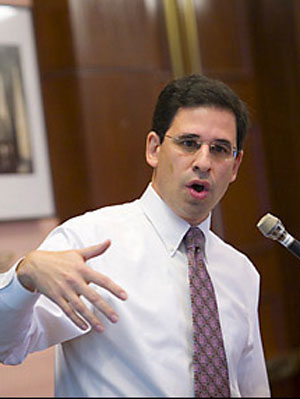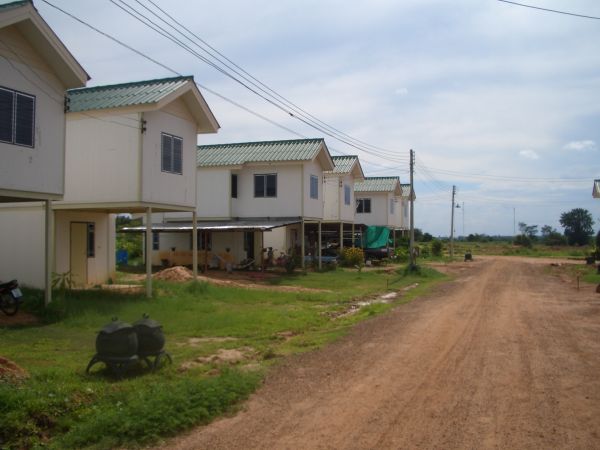Is the Housing Crisis Over?
Rory Doyle / There Is More Work To Be Done
Rory Doyle / There Is More Work To Be Done
For more on this topic, read the July 2014 issue of
 Eric Belsky, Managing Director, The Joint Center for Housing Studies at Harvard University
Eric Belsky, Managing Director, The Joint Center for Housing Studies at Harvard University
I think we have turned a corner in many places. Housing prices have started to move up again. Housing starts for both single family and multi-family are picking up. Home sales are also increasing. From a broad perspective, many markets are starting to head higher.
For more on this topic, read the July 2014 issue of .
In 2008 the U.S. economy fell off a cliff. Depending on your perspective it either slipped or was pushed from that precipice by the housing markets. But after six years where are we? How were rural Americans impacted, and are there lingering effects from the crisis? Rural Voices assembled four of the most knowledgeable experts in the affordable housing world to help answer these complex questions and provide insights on how to improve rural housing conditions in the wake of the housing crisis.
 Eric Belsky, Managing Director, The Joint Center for Housing Studies at Harvard University
Eric Belsky, Managing Director, The Joint Center for Housing Studies at Harvard University
I think we have turned a corner in many places. Housing prices have started to move up again. Housing starts for both single family and multi-family are picking up. Home sales are also increasing. From a broad perspective, many markets are starting to head higher.
Some places continue to struggle to recover from such a significant downturn. Employment levels in these areas have not returned to the previous peak. There are still places with abandoned and vacant units as a result of foreclosure problems. For these areas, it is harder to get capital flowing again.
Housing markets had enormous amounts of stress placed on them. This is partly due to the lending craze that resulted in many people buying homes that they could not afford. The bigger issue was the larger financial crisis and how that affected the broader economy. Many people became unemployed because of job losses that occurred in 2007 and 2008. They could not pay their mortgages or rents. Not everyone lost their job, many people found their hours curtailed. Some people replaced lost full time work with a part-time job. So, you had reductions in people’s incomes. All of those things created enormous stress on the housing market after a period of time where low interest rates and the availability of credit were driving up property values.
Rural home prices did not rise as much as they did in the suburbs or in urban areas. The drop in rural home prices was also less severe but it was still significant. Even so, rural areas did experience a strong house price cycle and prices remain well below the previous peak.
Parts of rural America have been struggling with chronic employment issues for a really long time. Add on to that a fall-off in construction, which is a very local activity, and the result is more damage in places that are already struggling.
The hole created by all of this fall-out tends to be cumulative. Consumer spending fell. Savings rates went up. People were feeling that they had better spend less and borrow less. Those things translated into job losses across the country.
New construction jobs are starting to appear in some rural areas located on the edges of metropolitan areas. Although these jobs are not actually in rural areas, they are close enough for commuting. Resource extraction, for example fracking, makes a place look very different. The classic case was North Dakota. If the whole country experienced the job growth over the last six years, as did North Dakota, which is mostly a rural state, we would have had a strongly growing national economy.
 Houses – Matthew – jargon777 – Creative Commons
Houses – Matthew – jargon777 – Creative Commons
Well established literature shows that people’s spending behaviors are influenced by their perceived wealth. When people think the values in their homes are higher, they are more likely to spend more freely than if the value of their home has gone down. When they do not have the cash to spend, they will borrow in order to do it. Many people refinanced their mortgages during the 2004-2006 period and they took cash out of their home equity in record amounts.
Today, it is very hard to get a loan against the equity in your home and a lot of people do not have equity in their home. This is starting to improve but it certainly is not completely in the rear view mirror. Job losses and employment continue to be a drag on many local economies.
There are both direct and indirect effects of the falloff in construction activity. Construction workers spend their wages in the local economies; they support the local stores and their local movie theater.
Certainly one of the most important aspects of the federal response is the very strenuous effort by the Federal Reserve to drive down long term interest rates.
When you look at some of the more specific tailored programs intended to address the housing crisis, I would say that both HARP and HAMP helped. Millions of borrowers were reached by these programs.
Some people, who otherwise might not have been able to, were able to reduce their mortgage payments because of HARP. The HAMP program has not affected as many homeowners, The Neighborhood Stabilization Program (NSP) was undersized relative to the extent of the need.
Certainly one of the most important aspects of the Federal response is the very strenuous effort by the Federal Reserve to drive down long-term interest rates.
If the economy continues to improve, which it does look like it will, house prices will also recover. This will restore people’s home equity, their ability to borrow, and their ability to spend. Some of the drag from government cuts is starting to abate and the economy seems to have forward momentum.
The housing market is very closely related to the broader economy. If the broader economy is doing better I would expect housing to get back on the road to recovery.
Higher interest rates have the potential contain the recovery on the homeownership side. In addition, credit standards still quite tight but they are getting a little less so.
Rental markets have been strong. Because of rental construction coming back and because many of the single family homes previously lost to foreclosures are coming back on the market for rent, you should see some moderation of rent increases.
The hardest thing to project is on the “for sale” side. What we are seeing is very unusual. There is a very low level of inventory of homes on the market. for sale Even though you see softness in sales, house prices are going up. The number of homes for sale is starting to creep back up which suggests moderation in house prices. This could help maintain the recovery but higher prices and rising interest rates will diminish affordability.